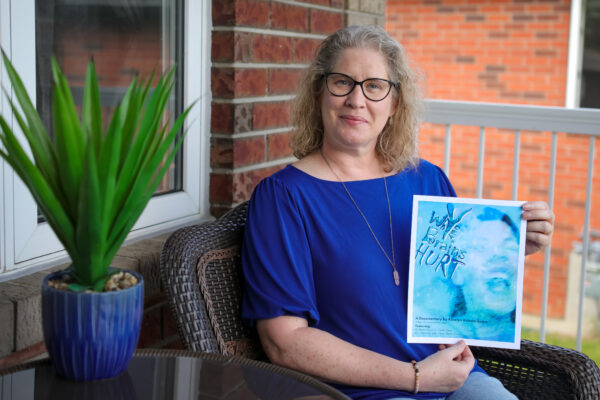Local woman shares her story in documentary on brain injuries

A local woman is involved in a documentary about persistent concussion syndrome and traumatic brain injuries (TBI).
Lindsay’s Melanie Hawkins appears in Why our Brain Hurts featuring five women with persistent concussion symptoms along with Canadian medical professionals. It is being filmed in Toronto and Niagara Falls.
Hawkins’ personal experience with TBI began in 2018 when she was working as a nurse manager. After a head injury caused by her dog striking her, she experienced various symptoms, including vertigo, vision changes, and severe headaches. Despite her symptoms, her doctor attributed them to psychological issues or burnout.
Her family physician ordered a full workup, including blood work, an MRI and a cat scan. “Everything came back normal.”
A few months later, she no longer felt safe driving on Highway 401 to work. “I just could not trust my perception.”
In late winter, Hawkins had to leave her job. With 500 employees under her and a self-described Type A personality, it was devastating. “I had to be on the ball and I wasn’t.”
While Hawkins’ family physician felt her condition was in her head, she had an epiphany. “One morning it just dawned on me to that this is just like it was in high school when I had that first concussion.”
She started attending a concussion clinic near Toronto three days a week, which featured OT, PT, vision and vestibular therapy along with a chiropractor and a neuro psychiatrist.
After seven months of treatment, the therapy started to pay off and Hawkins went back to work full time. The pandemic hit and she realized she could not work full time in the same position. She took another role successfully until February of 2023, when her vision changed and her symptoms started to come back. Hawkins also lost her driver’s license.
Unfortunately, she is unable to work now or go to the clinic. Her parents can no longer drive the distance and her husband, being the breadwinner, is unable to take time off to take her to the concussion clinic in Aurora.
Hawkins says there is a stigma with the condition. “If you were to see me, you would think, oh, there’s nothing wrong with her. Why is she not working?”
At 49, Hawkins feels her symptoms are now hormone related, as she did not have another concussion. She emphasizes how women’s hormones and menstrual cycles affect brain injury symptoms and recovery — aspects not considered in male-focused research.
Hawkins says the documentary’s main goals are addressing gender biases in medical treatment of TBI, educating viewers about the impact, creating community support for women suffering from the condition, and challenging the medical system to improve care for women.
The documentary’s statistics highlight how doctors refer women to neurologists for MRIs less often, frequently send them to therapists or mental health workers, and more often tell them their symptoms are emotional, psychological, or psychosocial.
Another striking statistic is shared in the film is that for every NHL player with a concussion, approximately 7,000 Canadian women suffer similar injuries from intimate partner violence.
Why Our Brains Hurt reveals the unique experience of women concussion survivors. Writer and director and TBI survivor Roselyn Kelada-Sedra says the film shows TBI has a disproportionately severe impact on women because of the medical system’s male-centred bias.
Kelada-Sedra is looking for sponsorships in making the documentary. Queries or donations can be sent to .





What an interesting story. I think brain injuries are far more common than most realize. I suffered a concussion after I was hit on Highway 2 in Beamsville in 2002 while stopped behind a car turning left by a man driving in excess of 80 km/hour. I lost consciousness as a result and suffered mobility and dental injuries as well that interfered with my ability to work at Brock University teaching BEd. courses. After I moved to Lindsay and volunteered on the board of a local NFP some years later, I suffered another injury that I would not have expected had I not suffered the earlier injury. I was defending a volunteer story teller to an employee who was very angry. He raised his fist into the air and brought it down to within an inch of my face before pounding it onto the table in front of me. After that incident, I couldn’t sleep and I couldn’t even tell what time of day it was or what month it was and I was totally disoriented. When it didn’t go away after a few days, I attended the Ross Memorial Hospital where I got help from their Trauma Nurse. I think Melanie Hawkins is very brave to tell her story because she is right that there is a stigma attached to ABI. It is hard enough to get along in this world without everyone misunderstanding what you are all about. I wish her all the greatest success with her documentary.
I also have had 2 concussions, 1st when I was very young probably around years and 2nd in my late 40’s.
I noticed last few years subtle changes, examples from driving or reading. I’m 70 now have been on glaucoma drops for several years. Whether these conclusions brought my eye issues on quicker hard to say.
I also have had 2 concussions, 1st when I was very young probably around 5 years and 2nd in my late 40’s.
I noticed last few years subtle changes, examples from driving or reading. I’m 70 now have been on glaucoma drops for several years. Whether these concusions brought my eye issues on quicker hard to say